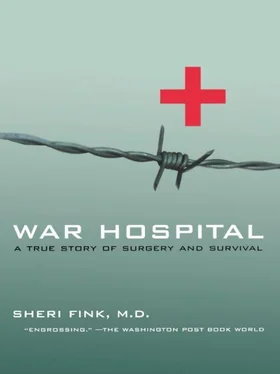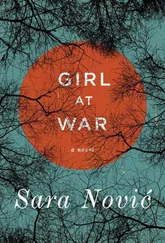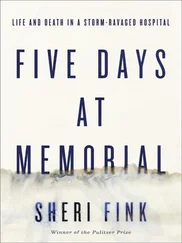On a Sunday afternoon in the first week in April, Eric sat in his living room watching live television coverage of a peace protest in Bosnia, another republic that was breaking off from Yugoslavia. Eric had visited Bosnia numerous times and the people in the multiethnic republic always insisted, “We won’t fight here.” But lately that had changed. “If we fight here,” someone told him, “it will be worse than Lebanon.”
When he visited a few days ago, the roads were studded with checkpoints, the evenings were disturbed by shelling and gunfire, and the word on the street was, “It’s going to be soon.” He passed through a city, Bijeljina, where Serb troops had recently taken control. Frightenedappearing Muslim men were gathered on the sidewalks, and they told Eric they were trying to prove they didn’t have weapons. At the hospital, the former director, a Muslim replaced the previous day by a Serb, whispered that the mortuary was full—executions.
The previous month, Bosnians passed a referendum to leave Yugoslavia and—although the vast majority of Serbs boycotted the vote—on March 6, Bosnian President Alija Izetbegović had declared Bosnia-Herzegovina an independent and sovereign state. Just as in Croatia, nationalist leaders rallied Bosnia’s Serbs against becoming a minority in a newly independent country. Beginning April 1, Serb paramilitary groups opposed to Bosnia’s independence occupied ethnically mixed Bosnian cities such as Bijeljina, Zvornik, and Foća, murdering some non-Serbs and triggering the flight of the non-Serb populations.
Thousands of marchers were now gathered in the capital, Sarajevo, taking a stand against interethnic distrust and trying to prevent the outbreak of all-out war. Eric heard shots ring out and watched as the camera panned to some felled marchers. People looked panicky. Then Eric saw something that amazed him—the protesters refused to flee. They stood steady and raised their fists toward the killers, howling in indignation. Eric felt his throat tighten. A medical student on the peace march was killed. The flames of war leapt up to consume Bosnia.
THAT SAME FIRST WEEK OF APRIL 1992, Dr. Ilijaz Pilav, a twenty-eight-year-old general practitioner at the Srebrenica health clinic, also sat glued to his television set, watching images of a reality he had, until then, failed to imagine. With small, intense eyes beneath thick, worried brows, he took in news of the violence kicking up in nearby towns, hopping like a tornado toward Srebrenica. In spite of the dissolution of Yugoslavia and the fighting in Croatia, the possibility of war in Bosnia had merely tickled the edge of his conscious mind, a mind more focused on personal concerns and a major family illness.
These days, Ilijaz often made the half-hour drive to his boyhood home, guiding his new, white Yugo south on the main road out of Srebrenica, then west into the hills to the tiny rural village of Gladovići. Despite years of city living and a professional education, Ilijaz’s countrified appearance clung to him.
His family raised livestock and grew vegetables and fruit on a hillside that inched down to the Drina River canyon, the natural border between the Yugoslav republics of Bosnia and Serbia. As a young boy, his typical day began with the crowing of roosters. From the windows of the family’s two-story house, Ilijaz would peer across the blue river to the biggest mountain in western Serbia, Tara, tracing the road that zigzagged from a height of more than 4,200 feet down the face of one of its peaks toward the Perućac hydroelectric dam.
The crisp, fresh air filled with the lowing of cows and the yodels loosed by villagers. His mother labored in the kitchen, stooping over a table to roll thin leaves of dough that she layered into pans to bake meat pies called burek or, when guests appeared, swiveling the handle of a copper coffee grinder in her lap, elbows akimbo. His father worked the land with his older brothers, angling groundward to chop wood, harvest crops, pitch hay, and slash the tall grasses. Ilijaz, the baby of the family, watched and begged to wield the scythe.
“You’re too little!” they cried as they shooed him.
When he asked what he could do to help, they told him to stay out of the way. So Ilijaz found other children to lead in games. He picked fights when he thought he had good cause, learned to read and write by looking over the shoulder of a school-aged friend, and gamboled through the woods and meadows.
At day’s end, the waning sun flooded the land with light, gilding the cornstalks and tree branches, illuminating the haystacks and brushing the bends of the river with red. Light still dappled the plains on the Drina’s opposite bank after evening shade had blanketed Gladovići. A lick of fog sometimes advanced and covered the village with a ghostly glow. Later, separated from his birthplace forever, it would seem to Ilijaz that winters in Gladovići never felt cold and summers shimmered with more sunshine than anywhere else.
The idyll ended when he entered school. The schoolhouse walls and the daily commitments impinged on Ilijaz’s freedom, and he burst out to do his homework in the light of the open sky. Accidents of fate had guided his destiny from birth when his parents named him “Ilijas,” but the clerk writing the birth certificate misheard and wrote down “Ilijaz.” School was no different. His fate changed when a first-grade teacher failed to pick him for her class of “best” students. He started studying harder, resolving to disprove the teacher’s pessimistic forecast.
His father encouraged his studies and hoped, without pushing him, that he would become a doctor. He also taught him about God, called Allah, and their religion, Islam, stressing that it counseled respect not only for himself and his own people—all of Gladovići’s 500 or so inhabitants were Bosnian Muslim—but also those who practiced other religions.
Ilijaz mostly ignored religion, focusing instead on his studies. When he finished primary school as one of the top students, there was nowhere to go but out. The hillside villages had no high school, so his father sent him to live with a sister and study in Srebrenica, a city of 6,000. Ilijaz missed nature. He missed his parents. Still, he did well in math and physics and planned to become an electrical engineer. A few days after high school graduation, he and a group of classmates traveled to Bosnia’s capital to enroll at the University of Sarajevo. The thought of living in Bosnia’s biggest city filled the small-town teenagers with excitement. The university departments were spread around the unfamiliar city, and Ilijaz stopped a police officer to ask for directions to the school of engineering.
“Oooohhh,” the officer said, “engineering is all the way in Lukavica, seven and a half miles from here.”
Ilijaz certainly had not come to the big city to spend four years in a suburb. That moment he ruled out a career in engineering.
“What department is closest to here?” Ilijaz asked the policeman.
The man put a finger to his mouth and thought for a second.
“The medical school’s over there.” He pointed up a hill. Ilijaz thanked him.
What was a doctor? Ilijaz barely knew. He’d had only a few brushes with the type. He remembered vaccination day at school, when he’d sneaked out of line after watching white-coated adults stick needles into children’s arms. He’d considered their actions an injustice, and leaving was his form of protest. Only once, when he’d had a sore throat, had he met a doctor face to face—Sabit Begić, a pale man in a white coat that blended with the colorless walls that surrounded him. Ilijaz had grown up healthy in a place where yearly checkups were not the norm.
But recently, while flipping television channels, he’d come across a program showing a doctor performing cardiovascular surgery. He’d watched the whole broadcast, fascinated. These thoughts propelled him up the steep, winding street and into the drab brick medical school building. In the hallway, a woman bustled past carrying a cage with white mice. He fought the urge to run back outside. Let’s move on, he told himself. He found the admissions office and handed his high school records to the secretary.
Читать дальше












